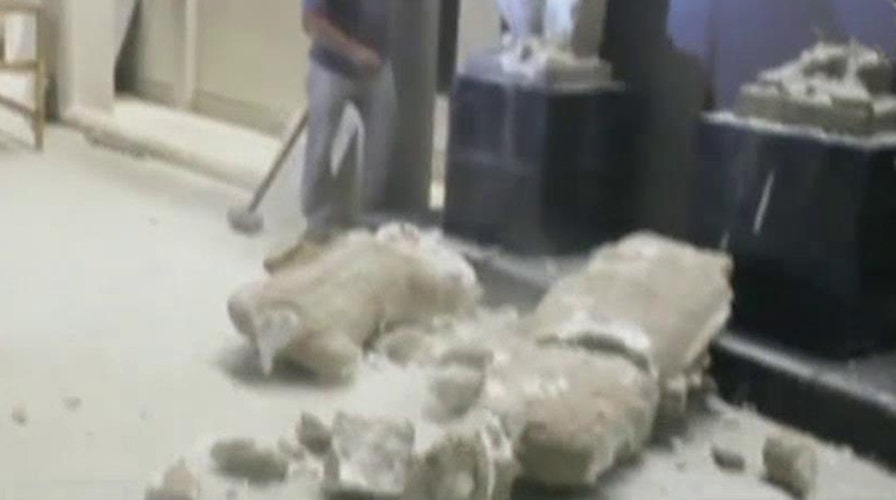When Jabbar Jaafar watched video of ISIS members with sledge-hammers smashing artifacts as old as antiquity, the Iraqi-born cultural activist was outraged over a loss he described as immeasurable.
Jaafar's anger at the destruction of Iraqi artifacts, relics and statues by terrorists prompted him and his colleague, Iraqi archeologist Abdulamir Al Hamdani at Stonybrook University, to protest outside the White House Tuesday with 100 other cultural activists. Jaafar and Al Hamdani work with the group Saving Antiquities for Everyone, or SAFE, an organization founded in 2003 in response to the looting of the Iraq Museum during which thousands of objects were taken -- some 3,000 to 7,000 are still missing.
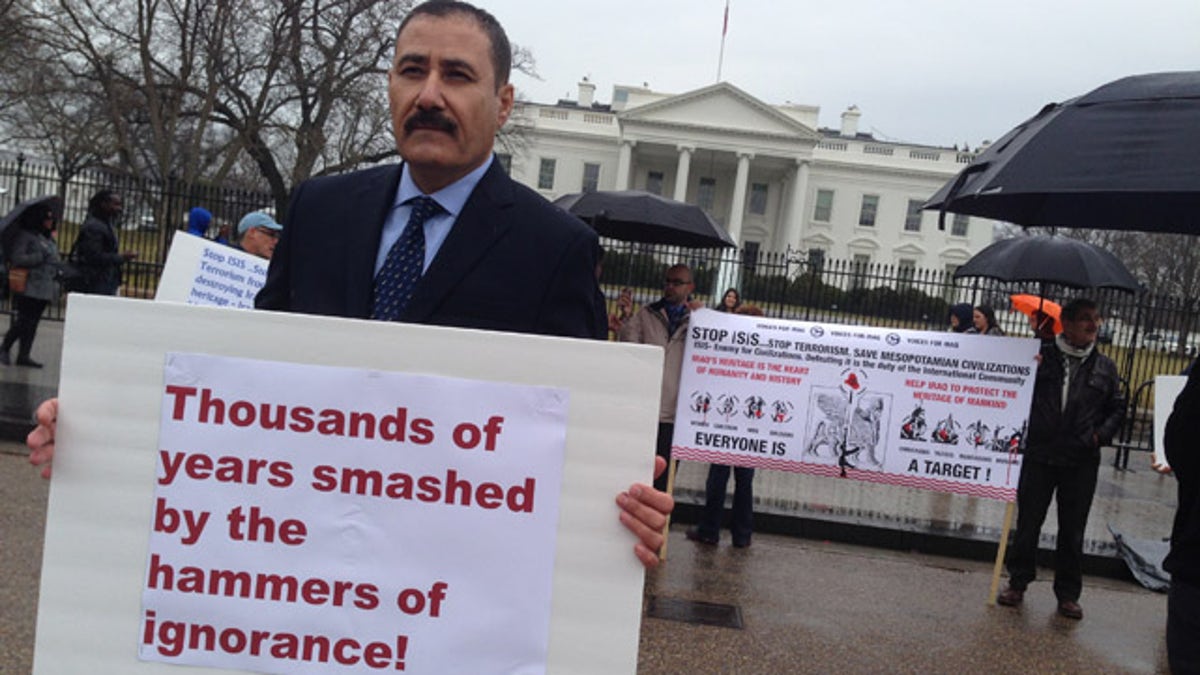
(Marie Helene Carleton/Four Corners Media)
"I couldn't sleep that night," Jaafar said, after watching the videotaped destruction by ISIS of artifacts in Mosul last month. "These objects are as old as civilization."
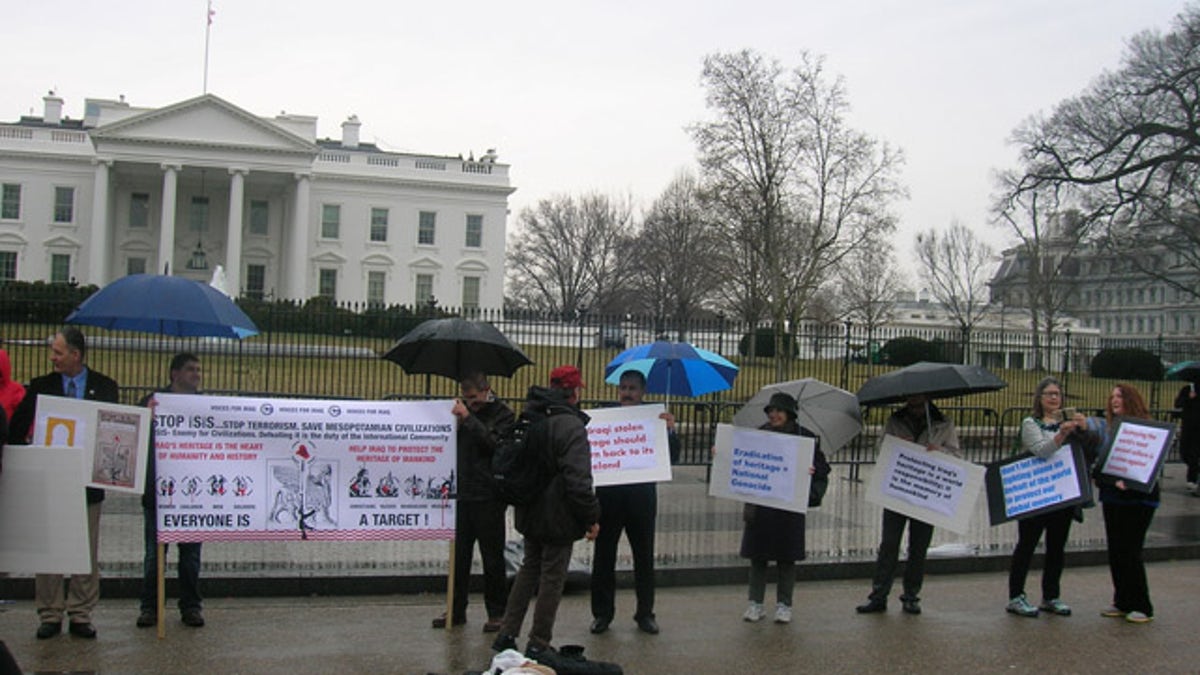
(Marie Helene Carleton/Four Corners Media)
"ISIS is destroying the heritage of mankind," said Jaafar, who came from Iraq to the U.S. in 2008 and worked for the Iraqi Cultural Center in northern Virginia. "These pieces -- more than 3,000 years old -- are gone forever. They can never be replaced."
The latest target of the Islamic State is Hatra, a 2,000-year-old city and archaeological site in northern Iraq that had parts demolished by ISIS militants last week, according to Kurdish officials. The terrorists damaged and looted the city one day after bulldozing the historic city of Nimrud.
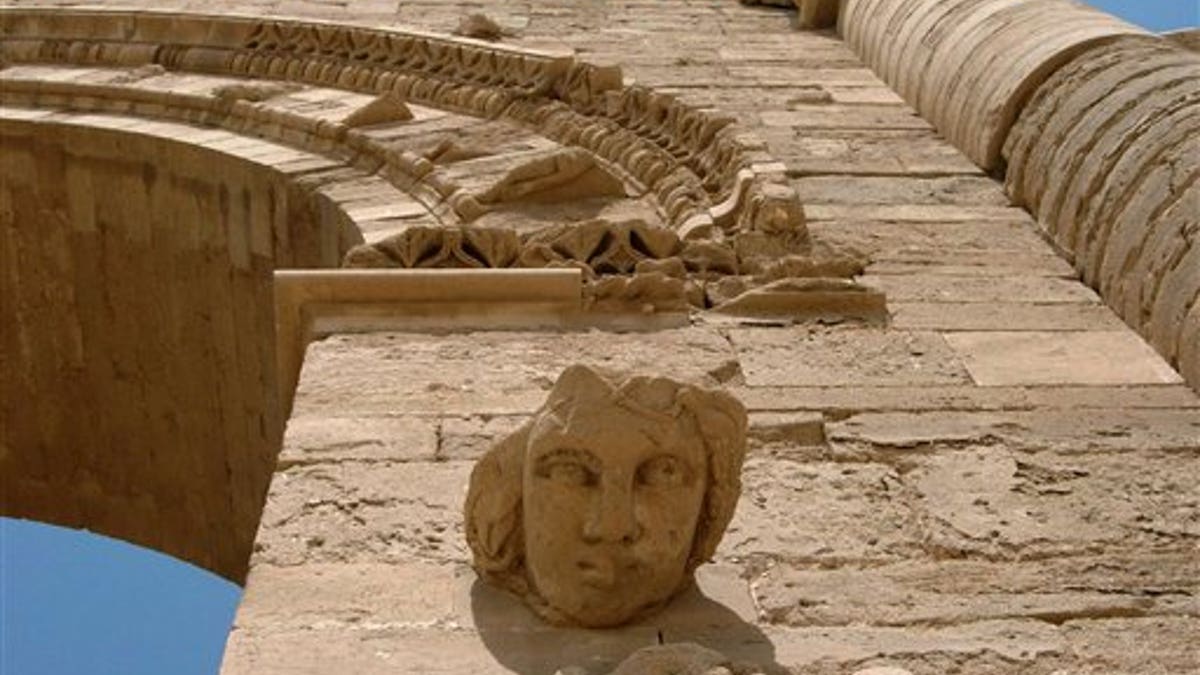
FILE - In this July 27, 2005 file photo, the face of a woman stares down at visitors in the Hatra ruins, 320 kilometers (200 miles) north of Baghdad, Iraq. Iraq's minister of tourism and antiquities told The Associated Press, Saturday, March 7, 2015, that the government is investigating reports that the ancient archaeological site of Hatra in northwestern Iraq is being demolished by militants from the Islamic State group. The group has already looted artifacts from Nimrud, another ancient archaeological site, on Friday and bulldozed it in a move UNESCO deemed "a war crime." (AP Photo/Antonio Castaneda) (AP)
Hatra, located 68 miles southwest of the city of Mosul, was a large fortified city during the Parthian Empire and capital of the first Arab kingdom. A UNESCO world heritage site, Hatra is said to have withstood invasions by the Romans in A.D. 116 and 198 thanks to its high, thick walls reinforced by towers. The ancient trading center spanned 4 miles in circumference and was supported by more than 160 towers. At its heart are a series of temples with a grand temple at the center — a structure supported by columns that once rose to 100 feet.
"The destruction of Hatra marks a turning point in the appalling strategy of cultural cleansing under way in Iraq," said Irina Bokova, the director-general of UNESCO, and Abdulaziz Othman Altwaijri, director general of the Islamic Educational, Scientific and Cultural Organization (ISESCO) in a joint statement.
"With this latest act of barbarism against Hatra, [the IS group] shows the contempt in which it holds the history and heritage of Arab people."
The Sunni extremist group, which currently controls about a third of Syria and Iraq, is bent on demolishing any symbols it says promotes idolatry and violates its interpretation of Islamic law.
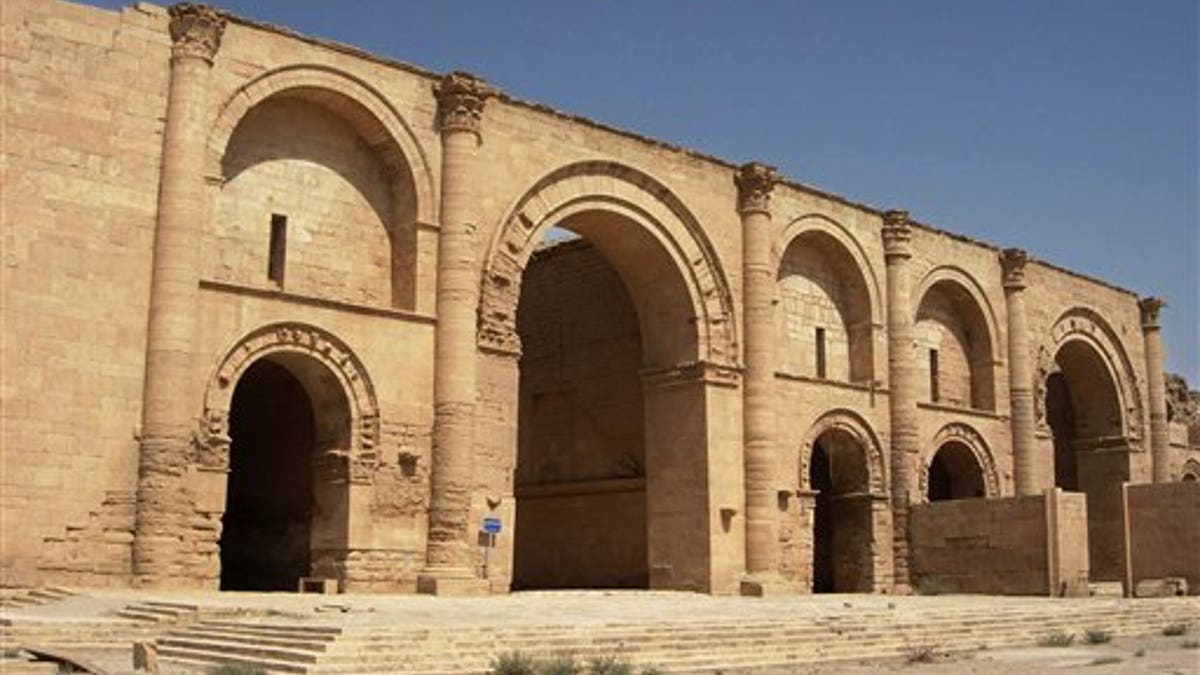
FILE - In this July 27, 2005 file photo, a temple to the Shamash sun god still stands over 1,750 years after the Sassanian empire razed the Mesopotamian city of Hatra, 320 kilometers (200 miles) north of Baghdad, Iraq. Iraq's minister of tourism and antiquities told The Associated Press, Saturday, March 7, 2015, that the government is investigating reports that the ancient archaeological site of Hatra in northwestern Iraq is being demolished by militants from the Islamic State group. The group has already looted artifacts from Nimrud, another ancient archaeological site, on Friday and bulldozed it in a move UNESCO deemed "a war crime." (AP Photo/Antonio Castaneda, File) (AP)
A video ISIS released last week shows militants smashing artifacts in the Mosul museum -- the majority of which came from Hatra. In January, the terror group also burned hundreds of books from the Mosul library and Mosul.
On Friday, the group looted artifacts from Nimrud, a 3,000-year-old city in Iraq, and bulldozed it in a move United Nations Secretary General Ban Ki-Moon declared "a war crime."
"Ancient Mesopotamia is really the cradle of civilization -- where we saw the first farming, the first cities, the first writing," Jack Green, chief curator at the Oriental Institute Museum at the University of Chicago, told FoxNews.com.
"There's a huge amount of knowledge and that knowledge is being destroyed systematically," Green said. "They’re not only destroying images of things – like artwork – but they're also looting artifacts and then smuggling them away."
The black market for ancient artifacts is a profitable avenue for ISIS as it continues to build its funds.
Green is urging people worldwide not to purchase antiquities, saying, "You may be acquiring objects that were taken from these sites."
"ISIS is destroying the heritage of mankind."
"If so, you are supporting ISIS," Green said.
The international group The Antiquities Coalition on Wednesday called for the U.S. and other nations to crack down on the sale of looted artifacts, acts considered war crimes under international law.
“ISIS is arming its campaign of terror in part by selling the past and robbing future generations of our history,” said Deborah Lehr, co-founder of The Antiquities Coalition. “We must constrict the terrorists’ ability to profit from the sale of plundered antiquities.
“If we don’t act now, there may be no past left to protect," she added. "With each artifact looted and sold onto the international market, only criminals, insurgents, terrorists — and the most unscrupulous of collectors — profit. The rest of us all lose.”
The Islamic State's push to demolish history hasn't hit Baghdad, where officials reopened Iraq's National Museum on Saturday -- more than a decade after some 15,000 objects were stolen during the U.S. occupation of the country. According to the AFP, the museum opened its doors earlier than expected in response to the destruction of artifacts in Mosul last month by ISIS.
"The events in Mosul led us to speed up our work and we wanted to open it [the museum] today [Saturday] as a response to what the gangs of IS did," Qais Hussein Rashid, the deputy tourism and antiquities minister, told AFP.
"This is a very happy day," he said.
The museum, also known as the Baghdad Archaeological Museum, contains exhibits ranging from bone and stone tools used 100,000 years ago by Stone Age hunter-gatherers in modern-day northern Iraq, artifacts from the Sumerian and Old Babylonian dynasties, including 5,000-year-old carved limestone statues, and numerous relics and treasures from Babylon, the rise of Islam more than 1,000 years ago and modern times.
Iraqi museums, mosques, churches, schools and government buildings are awash in priceless artifacts, but the embattled nation's historians and archaeologists fear for what is being lost every day. The Baghdad Museum's website features a terse indictment of the terror group on an all black homepage.
"2015: ISIS destroys what is left of ancient history," it reads.
FoxNews.com's Cristina Corbin and The Associated Press contributed to this report.
